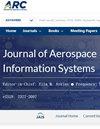Two-Stage Multicriteria Decision-Making Framework for Aircraft Conflict Resolution
IF 1.5
4区 工程技术
Q2 ENGINEERING, AEROSPACE
引用次数: 0
Abstract
In this study, a two-stage multicriteria decision-making framework for aircraft conflict resolution in the air traffic management system is proposed. Aircraft conflict resolution has been commonly solved based on single-objective optimization. However, the existing approach may not provide a satisfactory solution to all stakeholders involved in the air traffic management system. Therefore, in the first stage of the proposed algorithm, a new conflict resolution strategy is presented based on multiobjective optimization in which multiple-objective functions are optimized simultaneously. Each objective function is designed to take into account the interests of various stakeholders, and the augmented epsilon-constraint method is applied to determine Pareto optimal solutions. In the second stage, the best compromise solution among the Pareto optimal solutions is determined based on the technique for order performance by similarity to the ideal solution. The numerical simulation results show that the proposed algorithm provides a better solution from the perspective of mitigating the competing interests among stakeholders than the existing approach based on single-objective optimization.飞机冲突解决的两阶段多准则决策框架
本文提出了一种针对空中交通管理系统中飞机冲突解决的两阶段多准则决策框架。飞机冲突的解决通常基于单目标优化。然而,现有的方法未必能为参与空中交通管理系统的所有持份者提供满意的解决方案。因此,在该算法的第一阶段,提出了一种新的基于多目标优化的冲突解决策略,其中多目标函数同时优化。每个目标函数都考虑了各利益相关者的利益,并采用增广的epsilon约束方法确定Pareto最优解。在第二阶段,基于与理想解相似度的顺序性能技术,确定Pareto最优解中的最佳折衷解。数值模拟结果表明,与现有的基于单目标优化的方法相比,该算法从减轻利益相关者之间的利益竞争的角度提供了更好的解决方案。
本文章由计算机程序翻译,如有差异,请以英文原文为准。
求助全文
约1分钟内获得全文
求助全文
来源期刊

Journal of Aerospace Information Systems
ENGINEERING, AEROSPACE-
CiteScore
3.70
自引率
13.30%
发文量
58
审稿时长
>12 weeks
期刊介绍:
This Journal is devoted to the dissemination of original archival research papers describing new theoretical developments, novel applications, and case studies regarding advances in aerospace computing, information, and networks and communication systems that address aerospace-specific issues. Issues related to signal processing, electromagnetics, antenna theory, and the basic networking hardware transmission technologies of a network are not within the scope of this journal. Topics include aerospace systems and software engineering; verification and validation of embedded systems; the field known as ‘big data,’ data analytics, machine learning, and knowledge management for aerospace systems; human-automation interaction and systems health management for aerospace systems. Applications of autonomous systems, systems engineering principles, and safety and mission assurance are of particular interest. The Journal also features Technical Notes that discuss particular technical innovations or applications in the topics described above. Papers are also sought that rigorously review the results of recent research developments. In addition to original research papers and reviews, the journal publishes articles that review books, conferences, social media, and new educational modes applicable to the scope of the Journal.
 求助内容:
求助内容: 应助结果提醒方式:
应助结果提醒方式:


